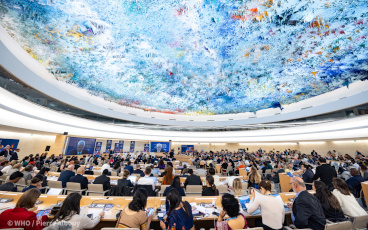The polio eradication family mourns its own
No intention of curtailing operations in Nigeria
 The polio eradication family is mourning its own. The World Health Organization and UNICEF, two of the spearheading partners of the Global Polio Eradication Initiative, both lost staff in the attack on UN House in Abuja, Nigeria on 26 August.
The polio eradication family is mourning its own. The World Health Organization and UNICEF, two of the spearheading partners of the Global Polio Eradication Initiative, both lost staff in the attack on UN House in Abuja, Nigeria on 26 August.
Mr. Johnson Awotunde was with UNICEF as a specialist in Monitoring and Evaluation. His work was critical for the production, with the government, of the best facts and statistics on the state of children. These are used widely by aid professionals as they assess need and decide where to place resources. He leaves a widow and six children.
Mr. Ahmed Abiodun Adewale-Kareem was a logistician at UNICEF and developed particular expertise on the safe importation of vaccines for mass immunisation campaigns. The trust he had established with officials and his ability to ensure the delivery of millions of doses has underpinned the success of immunisation campaigns across the country. He was married with two children. Mr. Adewale- Kareem died when he left his office to meet Mr. Sunday Ekere James, a Shipping Agent who was also killed when he arrived to pick up papers regarding a new polio campaign. Over the years, Mr James worked closely with UNICEF and was the first choice to help ensure the safe arrival of critical commodities.
Dr Edward Dede worked with WHO as National Professional Officer, Routine Immunization. His significant contribution to strengthening routine immunization, polio eradication and other accelerated control of vaccine-preventable diseases was not limited to Nigeria. Dr Dede contributed to several regional initiatives including the updating of the AFRO Expanded Programme on Immunization regional mid-level management modules. Between October 2010 and April 2011, Dr Dede provided technical support to the polio eradication effort in Luanda province in Angola. Moments before his death, he had been inaugurated as the President of the WHO Nigeria Staff Association for 2011-2013. He leaves behind a widow and two children.
Engineer Musa Ali worked with WHO as the Zonal Logistics Assistant for the North West Zone, based in Kano. He ensured the smooth running of WHO operations, including security, staff movements and overall logistical issues within the North West Zone, which includes most of the polio high-risk states in the country. Engineer Musa’s excellent performance contributed to the significant reduction in polio burden in recent years. Just before his death, he had been elected Vice President (North West Zone) of the WHO Staff Association. He leaves behind a widow and three children.
Prince Abraham A. Osunsanya was instrumental at WHO in boosting donor confidence through strengthening the administration of immunization programmes to save and improve the lives of children in Nigeria. He leaves behind a widow and two children.
The event claimed the lives of 23 people including these three staff from WHO and two from UNICEF, and injured many more. Four WHO staff and two UNICEF staff are among the critically injured. The immediate priority is to ensure the care of those injured and to support the surviving staff and the families of the bereaved.
WHO and UNICEF have no intention of curtailing their work with Nigeria and are working around the clock to counsel the bereaved, ensure care of the injured and maintain operations. Together with our partners, we remain committed to the eradication of polio in Nigeria and ensuring that its children will have a future free of the scourge of polio.













